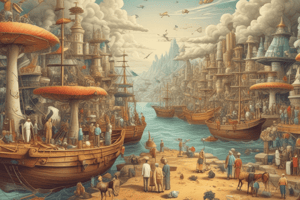Podcast
Questions and Answers
What is the definition of culture in the context of social science theory?
What is the definition of culture in the context of social science theory?
Culture is a shared set of beliefs, values, norms, and behaviors that shape and are shaped by social interactions.
How is social identity defined within the realm of social science theory?
How is social identity defined within the realm of social science theory?
Social Identity is an individual's self-concept that is derived from their group memberships and affiliations.
What does the term 'power' refer to in social science theory?
What does the term 'power' refer to in social science theory?
Power is the ability to influence, control, or shape social interactions and decision-making processes.
Explain the significance of socialization in social science theory.
Explain the significance of socialization in social science theory.
What is the role of social structure in social science theory?
What is the role of social structure in social science theory?
What is the main focus of Structural Functionalism in social sciences?
What is the main focus of Structural Functionalism in social sciences?
How does Conflict Theory contribute to the study of human societies?
How does Conflict Theory contribute to the study of human societies?
What does Symbolic Interactionism emphasize in shaping social behavior?
What does Symbolic Interactionism emphasize in shaping social behavior?
According to Social Constructionism, how are social facts and realities perceived?
According to Social Constructionism, how are social facts and realities perceived?
What is the primary goal of Critical Theory in social sciences?
What is the primary goal of Critical Theory in social sciences?
Flashcards are hidden until you start studying
Study Notes
Exploring Social Sciences through the Lens of SST (Social Science Theory)
SST, or Social Science Theory, refers to the well-established, evidence-based frameworks and principles that social scientists use to understand, explore, and explain human behavior and interactions. These theories are the backbone of social sciences, which encompass a wide range of disciplines such as sociology, political science, psychology, anthropology, and economics.
Theoretical Approaches in Social Sciences
Social sciences employ various theoretical lenses to make sense of the complexities of human societies. Some prominent perspectives include:
- Structural Functionalism: An approach that focuses on how social structures and institutions maintain stability and meet the needs of society.
- Conflict Theory: A perspective that highlights the ongoing power struggles and conflicts within societies, revealing social inequalities and injustices.
- Symbolic Interactionism: An approach that emphasizes the importance of shared meanings, symbols, and interactions in shaping social behavior.
- Social Constructionism: A perspective that asserts that social facts and realities are constructed, negotiated, and agreed upon through social interactions and discourses.
- Critical Theory: A perspective that critically examines the power dynamics, ideologies, and social structures in society, aiming to promote social justice and emancipation.
Key Concepts in SST
There are several important concepts that are closely associated with Social Science Theory.
- Socialization: The process through which individuals learn the norms, values, and behaviors of their society.
- Culture: A shared set of beliefs, values, norms, and behaviors that shape and are shaped by social interactions.
- Socialization: The process through which individuals learn the norms, values, and behaviors of their society.
- Power: The ability to influence, control, or shape social interactions and decision-making processes.
- Social Identity: An individual's self-concept that is derived from their group memberships and affiliations.
- Social Structure: The patterns and organization of social relationships, roles, and institutions within a society.
- Socialization: The process through which individuals learn the norms, values, and behaviors of their society.
SST in Action
Social Science Theory can be applied in various contexts to enhance our understanding of diverse human interactions, social phenomena, and behavioral patterns.
- Social Psychology: Exploring the cognitive, emotional, and behavioral processes that influence interpersonal interactions and group dynamics.
- Political Science: Examining the behavior of political actors, institutions, and systems, as well as the impact of social forces on political outcomes.
- Sociology: Analyzing social interactions, social networks, and social structures to understand how they shape individual behavior and social outcomes.
- Anthropology: Exploring cultural variations, social systems, and human behavior across different societies and historical periods.
- Economics: Studying the behavior of individuals, groups, and organizations in the context of resource allocation, production, and distribution within societies.
Conclusion
Social Science Theory provides a valuable framework for making sense of the complexities of human societies. By applying these theoretical perspectives and concepts, social scientists can better understand, explain, and predict social phenomena and behavioral patterns. Whether you're interested in politics, economics, psychology, sociology, or anthropology, SST offers a rich and diverse array of perspectives that can deepen your understanding of human behavior and social interactions. So, the next time you encounter a social science concept or theory, remember that it's a window into the fascinating world of human behavior and society.
Studying That Suits You
Use AI to generate personalized quizzes and flashcards to suit your learning preferences.




